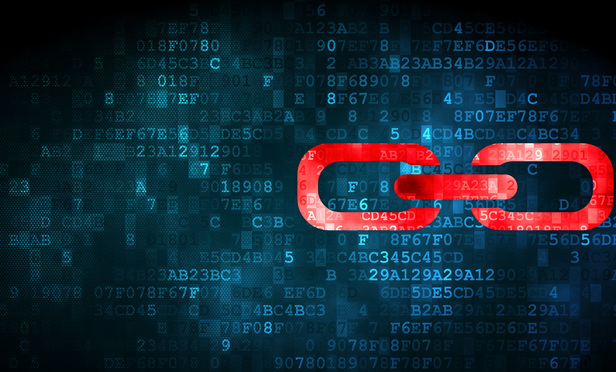 Maksim Kabakou/Shutterstock.com
Maksim Kabakou/Shutterstock.com Blockchain's Promising Future in Battling Counterfeit Luxury Goods
The rise in e-commerce and online secondary retail markets, particularly during the past year with much of the world confined to small-screen shopping, has added fuel to the fire. Leading luxury retailers are now turning to blockchain technologies in an effort to douse the flames.
March 25, 2021 at 10:42 AM
5 minute read
Counterfeit goods—those unauthorized products that deliberately imitate the legitimate goods of others so as to mislead consumers as to their true nature—plague retailers across all industries. In 2019 alone, the Organization for Economic Cooperation and Development (OECD) reported that counterfeit goods accounted for more than 3.3% of global trade. At best, counterfeit goods are lower quality products meant to imitate the original. At worst, they can be downright dangerous. Consumers can inadvertently end up with tainted baby formula, spontaneously combusting batteries or malfunctioning brake pads. In any case, counterfeit goods harm both consumers and retailers. They blur the line between the retailer and imitator; and they damage that retailer's business, reputation and goodwill.
For luxury brands, annual losses from counterfeit goods reach well into the billions. Despite concerted efforts to thwart imitators, the market for fakes continues to grow. The rise in e-commerce and online secondary retail markets, particularly during the past year with much of the world confined to small-screen shopping, has added fuel to the fire. Leading luxury retailers are now turning to blockchain technologies in an effort to douse the flames.
This content has been archived. It is available through our partners, LexisNexis® and Bloomberg Law.
To view this content, please continue to their sites.
Not a Lexis Subscriber?
Subscribe Now
Not a Bloomberg Law Subscriber?
Subscribe Now
NOT FOR REPRINT
© 2025 ALM Global, LLC, All Rights Reserved. Request academic re-use from www.copyright.com. All other uses, submit a request to [email protected]. For more information visit Asset & Logo Licensing.
You Might Like
View All
Federal Judge Dismisses Digital Privacy Suit Against E-Commerce Company
4 minute read
Federal Judge Sides With FedEx in Arbitration Dispute Over 'Transportation Worker' Definition
5 minute read
QVC Veteran Promoted to GC of Parent, Will Help Lead Turnaround Effort
Law Firms Mentioned
Trending Stories
- 1When Words Matter: Mastering Interpretation in Complex Disputes
- 2People in the News—Jan. 28, 2025—Buchanan Ingersoll, Kleinbard
- 3Digital Assets and the ‘Physical Loss’ Dilemma: How the Fourth Circuit’s Ruling on Crypto Theft Stands at Odds With Modern Realities
- 4State's Expert Discovery Rules Need Revision
- 5O'Melveny, White & Case, Skadden Beef Up in Texas With Energy, Real Estate Lateral Partner Hires
Who Got The Work
J. Brugh Lower of Gibbons has entered an appearance for industrial equipment supplier Devco Corporation in a pending trademark infringement lawsuit. The suit, accusing the defendant of selling knock-off Graco products, was filed Dec. 18 in New Jersey District Court by Rivkin Radler on behalf of Graco Inc. and Graco Minnesota. The case, assigned to U.S. District Judge Zahid N. Quraishi, is 3:24-cv-11294, Graco Inc. et al v. Devco Corporation.
Who Got The Work
Rebecca Maller-Stein and Kent A. Yalowitz of Arnold & Porter Kaye Scholer have entered their appearances for Hanaco Venture Capital and its executives, Lior Prosor and David Frankel, in a pending securities lawsuit. The action, filed on Dec. 24 in New York Southern District Court by Zell, Aron & Co. on behalf of Goldeneye Advisors, accuses the defendants of negligently and fraudulently managing the plaintiff's $1 million investment. The case, assigned to U.S. District Judge Vernon S. Broderick, is 1:24-cv-09918, Goldeneye Advisors, LLC v. Hanaco Venture Capital, Ltd. et al.
Who Got The Work
Attorneys from A&O Shearman has stepped in as defense counsel for Toronto-Dominion Bank and other defendants in a pending securities class action. The suit, filed Dec. 11 in New York Southern District Court by Bleichmar Fonti & Auld, accuses the defendants of concealing the bank's 'pervasive' deficiencies in regards to its compliance with the Bank Secrecy Act and the quality of its anti-money laundering controls. The case, assigned to U.S. District Judge Arun Subramanian, is 1:24-cv-09445, Gonzalez v. The Toronto-Dominion Bank et al.
Who Got The Work
Crown Castle International, a Pennsylvania company providing shared communications infrastructure, has turned to Luke D. Wolf of Gordon Rees Scully Mansukhani to fend off a pending breach-of-contract lawsuit. The court action, filed Nov. 25 in Michigan Eastern District Court by Hooper Hathaway PC on behalf of The Town Residences LLC, accuses Crown Castle of failing to transfer approximately $30,000 in utility payments from T-Mobile in breach of a roof-top lease and assignment agreement. The case, assigned to U.S. District Judge Susan K. Declercq, is 2:24-cv-13131, The Town Residences LLC v. T-Mobile US, Inc. et al.
Who Got The Work
Wilfred P. Coronato and Daniel M. Schwartz of McCarter & English have stepped in as defense counsel to Electrolux Home Products Inc. in a pending product liability lawsuit. The court action, filed Nov. 26 in New York Eastern District Court by Poulos Lopiccolo PC and Nagel Rice LLP on behalf of David Stern, alleges that the defendant's refrigerators’ drawers and shelving repeatedly break and fall apart within months after purchase. The case, assigned to U.S. District Judge Joan M. Azrack, is 2:24-cv-08204, Stern v. Electrolux Home Products, Inc.
Featured Firms
Law Offices of Gary Martin Hays & Associates, P.C.
(470) 294-1674
Law Offices of Mark E. Salomone
(857) 444-6468
Smith & Hassler
(713) 739-1250






